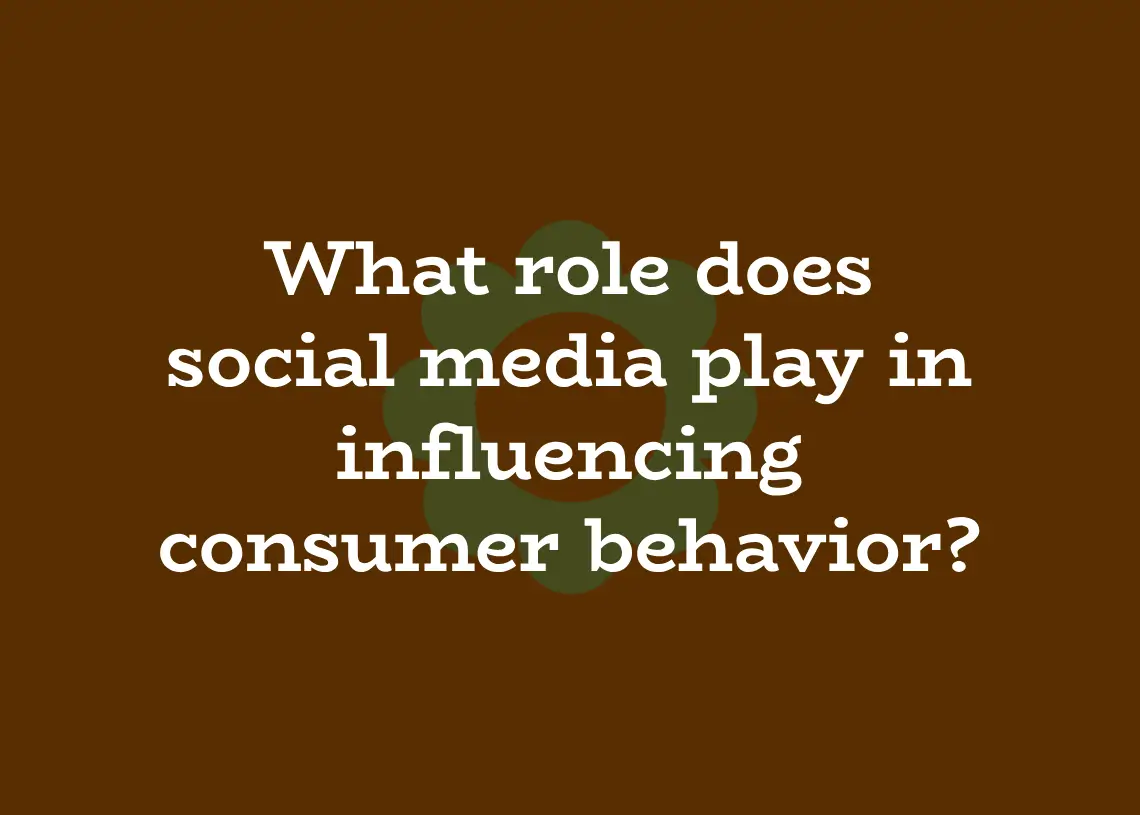Social media has become an integral part of our daily lives, changing the way we communicate, connect, and consume. With its power to reach millions of people at once, social media has a profound impact on consumer behavior. From influencing purchase decisions to shaping brand perceptions, social media has changed the way businesses interact with consumers.
In today’s digital age, businesses cannot afford to ignore the influence of social media. But with so many social media platforms available, it can be overwhelming for businesses to navigate the landscape. In this blog post, we will explore the role of social media in influencing consumer behavior.
We will discuss the various ways in which social media affects consumer decision-making, including the impact of social media marketing, user-generated content, and influencer marketing. We will also examine the challenges and opportunities that social media presents for businesses, and explore best practices for leveraging social media to drive sales and engagement.
Whether you’re a small business owner or a marketing professional, understanding the role of social media in consumer drive consumer engagement and loyalty. Ultimately, understanding the role of social media in influencing consumer behavior is essential for businesses seeking to remain competitive in today’s digital marketplace. By harnessing the power of social media, businesses can build stronger relationships with their customers, boost brand awareness and reputation, and drive sales and revenue growth.
Earn a certificate in your dream career for an affordable price at IAP Career College today!
Social media shapes consumer opinions
Social media has become an integral part of our daily lives, and its impact on consumer behavior cannot be ignored. One of the primary ways in which social media influences consumer behavior is by shaping opinions. Consumers increasingly rely on social media platforms such as Facebook, Twitter, and Instagram to gather information about products and services.
The content shared on these platforms, including reviews, comments, and ratings, can significantly impact consumers’ opinions about brands and products. Positive reviews and comments can increase a brand’s credibility and increase the likelihood of a purchase, while negative comments can have the opposite effect.
As a result, businesses must proactively manage their social media presence to ensure that consumer opinions are positively influenced and brand reputation is preserved.
Influencers impact purchasing decisions
In today’s world, social media has become an integral part of our daily lives, influencing our decisions and actions in various ways. One of the most significant impacts of social media on consumer behavior is the rise of influencers.
These individuals have gained a massive following on different social media platforms, allowing them to share their opinions and recommendations on products and services with their audience. Influencers have the power to impact purchasing decisions, as consumers often trust their recommendations and look to them for guidance on what to buy.
Brands have recognized this trend and are increasingly partnering with influencers to promote their products and reach a wider audience. As a result, social media has become a key marketing tool for businesses to influence consumer behavior and drive sales.
Brands use social media marketing
Social media has become an essential part of marketing strategies for brands seeking to reach consumers. One of the primary ways brands use social media is through social media marketing. This involves creating and sharing content on social media platforms to promote a brand, product, or service.
Social media marketing has become an effective tool for brands to connect with their audience, build brand recognition, and increase sales. By leveraging social media platforms, brands can target specific demographics and engage with consumers in real-time, allowing them to build meaningful relationships with their audience.
Overall, social media marketing has become an indispensable component of modern marketing strategies, and its influence on consumer behavior continues to grow.
Social proof drives consumer behavior
Social media platforms have become a crucial tool for businesses to market their products and services. One of the most significant benefits of social media is its ability to provide social proof, which plays a vital role in driving consumer behavior.
Social proof refers to the impact that the opinions and actions of others have on our own behavior. Social media provides an opportunity for businesses to showcase positive reviews, testimonials, and user-generated content to demonstrate their credibility and expertise in the market.
Consumers are more likely to trust and purchase from a business that has a strong social media presence and a positive reputation. Therefore, social proof should be a critical aspect of any business’s social media strategy, as it can significantly influence consumer behavior.
Consumer feedback influences brands
Consumer feedback has become a critical component of brand success in today’s digital age, where social media platforms serve as a hub for communication between businesses and consumers. Social media has democratized the feedback process, allowing consumers to easily share their thoughts and opinions on products and services with a wide audience.
This shift in power has given consumers a greater voice in shaping the reputations of brands, as companies can no longer solely rely on traditional marketing methods. Brands must actively engage with their customers on social media and effectively respond to feedback to maintain a positive reputation.
By doing so, brands can build stronger relationships with their customers, increase brand loyalty, and ultimately drive sales. Thus, it is crucial for businesses to monitor and respond to consumer feedback to stay competitive in the marketplace.
Social media ads target consumers
Social media has become an increasingly popular platform for advertising due to its ability to target specific audiences. It’s allow businesses to create and place advertisements that are tailored to their target audience based on demographics, interests, behaviors, and geographic location.
This enables businesses to reach consumers who are more likely to be interested in their products or services, resulting in a higher conversion rate and return on investment. In addition, social media platforms provide businesses with analytics to track the performance of their ads and make adjustments as necessary.
As a result, social media has played a significant role in influencing consumer behavior by presenting highly targeted and effective advertisements to potential customers.
Social media fosters brand loyalty
Social media has become an integral part of our daily lives, influencing not only personal communication but also consumer behavior. One significant impact of social media on consumer behavior is the way it fosters brand loyalty.
Social media platforms offer brands the opportunity to interact with their customers in a personalized manner, creating a sense of community and strengthening the bond between the brand and its customers. By providing users with regular updates, exclusive content, and special offers, brands can create a loyal following, leading to repeat sales and positive word-of-mouth recommendations.
Social media also allows customers to engage with brands directly, providing feedback and reviews, which can further enhance brand loyalty and influence purchasing decisions. As such, businesses that use social media effectively can reap the benefits of increased customer retention and brand loyalty.
User-generated content influences purchases
One of the most significant ways social media influences consumer behavior is through user-generated content (UGC). UGC refers to any content created by users of a brand or product, including reviews, testimonials, photos, and videos.
Consumers are more likely to trust UGC over brand-created content, as it is perceived as more authentic and unbiased. A study by TurnTo Networks found that 90% of consumers say UGC influences their purchasing decisions more than any other type of content.
This is because UGC provides social proof, showing potential customers how others have used and benefited from a product or service. Brands can leverage UGC by encouraging customers to share their experiences and using this content in their marketing efforts, leading to increased engagement and sales.
Social media analytics inform strategies
In today’s digital age, social media has emerged as a powerful tool to influence consumer behavior. Social media platforms like Facebook, Instagram, Twitter, and LinkedIn have become an integral part of our daily lives, and businesses are leveraging these platforms to reach out to their target audience.
Social media analytics plays a crucial role in informing and shaping the marketing strategies of businesses. By analyzing social media data, businesses can gain valuable insights into their audience’s behavior, preferences, and interests.
These insights can be used to develop targeted marketing campaigns that resonate with their target demographic. Social media analytics can also help identify trends and patterns in consumer behavior, allowing businesses to stay ahead of the curve and pivot their marketing strategies accordingly.
In short, social media analytics plays a vital role in helping businesses understand their audience and develop effective marketing strategies that drive results.
Social media drives e-commerce.
Social media has emerged as a powerful tool for businesses to engage with their customers and increase e-commerce sales. With over 3.6 billion people using social media worldwide, it has become an integral part of our daily lives.
Social media platforms such as Facebook, Instagram, Twitter, and Pinterest provide businesses with a unique opportunity to reach out to potential customers and promote their products. Studies have shown that social media drives e-commerce by influencing consumer behavior through various means such as social proof, personalized advertising, influencer marketing, and social media shopping features.
Therefore, it is essential for businesses to have a strong social media presence and effectively leverage it to drive e-commerce sales.
Conclusion: What role does social media play in influencing consumer behavior?
In conclusion, social media has become an integral part of the consumer decision-making process. Brands are leveraging social media platforms to connect with their target audience and influence their purchasing decisions.
By creating engaging content, responding to customer queries, and providing personalized recommendations, brands can develop a loyal following and drive sales. However, it is essential to approach social media with a strategic and ethical mindset, as consumers are becoming increasingly aware of the impact that social media has on their behavior.
Overall, social media presents a unique opportunity for brands to connect with consumers in a meaningful way and influence their behavior.




